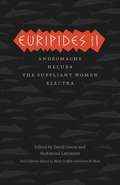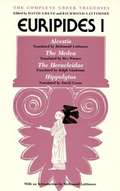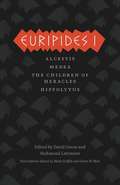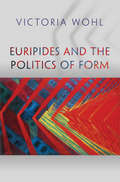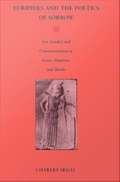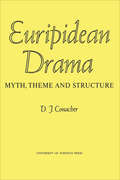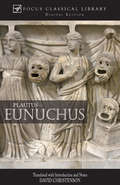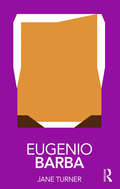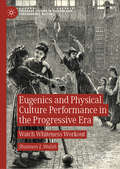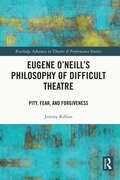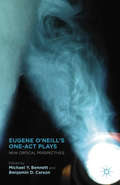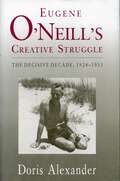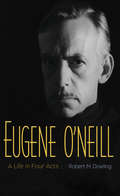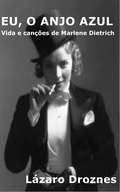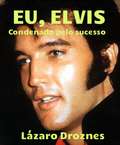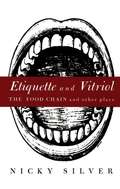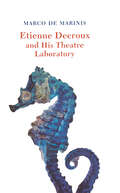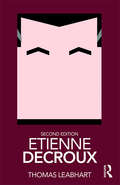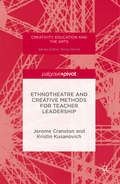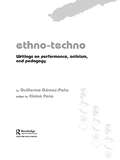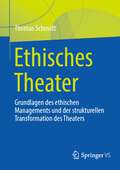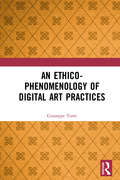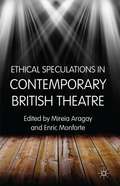- Table View
- List View
Euripides II
by David Grene Richmond Lattimore Mark Griffith Euripides Glenn W. MostEuripides II contains the plays "Andromache," translated by Deborah Roberts; "Hecuba," translated by William Arrowsmith; "The Suppliant Women," translated by Frank William Jones; and "Electra," translated by Emily Townsend Vermeule. Sixty years ago, the University of Chicago Press undertook a momentous project: a new translation of the Greek tragedies that would be the ultimate resource for teachers, students, and readers. They succeeded. Under the expert management of eminent classicists David Grene and Richmond Lattimore, those translations combined accuracy, poetic immediacy, and clarity of presentation to render the surviving masterpieces of Aeschylus, Sophocles, and Euripides in an English so lively and compelling that they remain the standard translations. Today, Chicago is taking pains to ensure that our Greek tragedies remain the leading English-language versions throughout the twenty-first century. In this highly anticipated third edition, Mark Griffith and Glenn W. Most have carefully updated the translations to bring them even closer to the ancient Greek while retaining the vibrancy for which our English versions are famous. This edition also includes brand-new translations of Euripides' Medea, The Children of Heracles, Andromache, and Iphigenia among the Taurians, fragments of lost plays by Aeschylus, and the surviving portion of Sophocles's satyr-drama The Trackers. New introductions for each play offer essential information about its first production, plot, and reception in antiquity and beyond. In addition, each volume includes an introduction to the life and work of its tragedian, as well as notes addressing textual uncertainties and a glossary of names and places mentioned in the plays. In addition to the new content, the volumes have been reorganized both within and between volumes to reflect the most up-to-date scholarship on the order in which the plays were originally written. The result is a set of handsome paperbacks destined to introduce new generations of readers to these foundational works of Western drama, art, and life.
Euripides I: Alcestis, The Medea, The Heracleidae, Hippolytus (The Complete Greek Tragedies #3)
by Euripides Rex Warner Ralph Gladstone Richmond Lattimore David GreneVolume 3 of the Grene and Lattimore editions, which offer the most comprehensive selection of the Greek tragedies available in English.
Euripides I
by David Grene Richmond Lattimore Mark Griffith Euripides Glenn W. MostEuripides I contains the plays "Alcestis," translated by Richmond Lattimore; "Medea," translated by Oliver Taplin; "The Children of Heracles," translated by Mark Griffith; and "Hippolytus," translated by David Grene. Sixty years ago, the University of Chicago Press undertook a momentous project: a new translation of the Greek tragedies that would be the ultimate resource for teachers, students, and readers. They succeeded. Under the expert management of eminent classicists David Grene and Richmond Lattimore, those translations combined accuracy, poetic immediacy, and clarity of presentation to render the surviving masterpieces of Aeschylus, Sophocles, and Euripides in an English so lively and compelling that they remain the standard translations. Today, Chicago is taking pains to ensure that our Greek tragedies remain the leading English-language versions throughout the twenty-first century. In this highly anticipated third edition, Mark Griffith and Glenn W. Most have carefully updated the translations to bring them even closer to the ancient Greek while retaining the vibrancy for which our English versions are famous. This edition also includes brand-new translations of Euripides' Medea, The Children of Heracles, Andromache, and Iphigenia among the Taurians, fragments of lost plays by Aeschylus, and the surviving portion of Sophocles's satyr-drama The Trackers. New introductions for each play offer essential information about its first production, plot, and reception in antiquity and beyond. In addition, each volume includes an introduction to the life and work of its tragedian, as well as notes addressing textual uncertainties and a glossary of names and places mentioned in the plays. In addition to the new content, the volumes have been reorganized both within and between volumes to reflect the most up-to-date scholarship on the order in which the plays were originally written. The result is a set of handsome paperbacks destined to introduce new generations of readers to these foundational works of Western drama, art, and life.
Euripides and the Politics of Form
by Victoria WohlHow can we make sense of the innovative structure of Euripidean drama? And what political role did tragedy play in the democracy of classical Athens? These questions are usually considered to be mutually exclusive, but this book shows that they can only be properly answered together. Providing a new approach to the aesthetics and politics of Greek tragedy, Victoria Wohl argues that the poetic form of Euripides' drama constitutes a mode of political thought. Through readings of select plays, she explores the politics of Euripides' radical aesthetics, showing how formal innovation generates political passions with real-world consequences. Euripides' plays have long perplexed readers. With their disjointed plots, comic touches, and frequent happy endings, they seem to stretch the boundaries of tragedy. But the plays' formal traits--from their exorbitantly beautiful lyrics to their arousal and resolution of suspense--shape the audience's political sensibilities and ideological attachments. Engendering civic passions, the plays enact as well as express political ideas. Wohl draws out the political implications of Euripidean aesthetics by exploring such topics as narrative and ideological desire, the politics of pathos, realism and its utopian possibilities, the logic of political allegory, and tragedy's relation to its historical moment.Breaking through the impasse between formalist and historicist interpretations of Greek tragedy, Euripides and the Politics of Form demonstrates that aesthetic structure and political meaning are mutually implicated--and that to read the plays poetically is necessarily to read them politically.
Euripides and the Poetics of Sorrow: Art, Gender, and Commemoration in Alcestis, Hippolytus, and Hecuba
by Charles SegalWhere is the pleasure in tragedy? This question, how suffering and sorrow become the stuff of aesthetic delight, is at the center of Charles Segal's new book, which collects and expands his recent explorations of Euripides' art. Alcestis, Hippolytus, and Hecuba, the three early plays interpreted here, are linked by common themes of violence, death, lamentation and mourning, and by their implicit definitions of male and female roles. Segal shows how these plays draw on ancient traditions of poetic and ritual commemoration, particularly epic song, and at the same time refashion these traditions into new forms. In place of the epic muse of martial glory, Euripides, Segal argues, evokes a muse of sorrows who transforms the suffering of individuals into a "common grief for all the citizens," a community of shared feeling in the theater. Like his predecessors in tragedy, Euripides believes death, more than any other event, exposes the deepest truth of human nature. Segal examines the revealing final moments in Alcestis, Hippolytus, and Hecuba, and discusses the playwright's use of these deaths--especially those of women--to question traditional values and the familiar definitions of male heroism. Focusing on gender, the affective dimension of tragedy, and ritual mourning and commemoration, Segal develops and extends his earlier work on Greek drama. The result deepens our understanding of Euripides' art and of tragedy itself.
Euripidean Drama: Myth, Theme and Structure
by Desmond ConacherIt is a commonly held view among historians of Greek literature that with the advent of Euripides the tragic structure, even the tragic outlook of Greek drama suffered a breakdown from which it never recovered. While there is much truth in this opinion, it has tended to put too much emphasis on "Euripides the destroyer" rather than "Euripides the creator." In this study the author's main purpose is to redress the balance and to discuss the structure and techniques of Euripidean drama in relation to its new and richly varied themes.The consistent dramatic form evolved by Aeschylus and Sophocles had grown out of their conception of tragedy as the resultant of the tension between the individual will and the universal order suggested in myth. For Euripides, who never fully accepted myth as the real basis of tragedy, alternate ways of using the traditional material became necessary, and the playwright continually changed his dramatic structure to suit the particular tragic idea he was seeking to express. Viewed in this way, Euripides' dramatic technique may be seen in positive as well as negative terms—as something other than the breakdown of structural technique and mythological insight under the overwhelming force of his ideas. Professor Conacher offers here a new view of Euripides as the first Greek dramatist properly to understand the world of myth, and so, in a sense, to stand a bit outside it. He shows how Euripides, far from being an impatient or incompetent craftsman, used traditional mth as a basis for inventing new forms in which to cast his perceptions of the sources of human tragedy. All the extant Euripidean drama is examined in this book; the result is an intelligent guide to the plays for all students of dramatic literature, as well as a convincing defence of Euripides the creator.
Eunuchus: The Eunuch
by Terence David ChristensonThe play Eunuchus provides an introduction to the world of Roman comedy from one of its best practitioners, Terence. As with all Focus translations, the emphasis is on an inexpensive, readable edition that is close to the original, with an extensive introduction, notes and appendices.
Eugenio Barba (Routledge Performance Practitioners)
by Jane TurnerEugenio Barba is recognized as one of the most important theatre practitioners working today. Along with the company he founded over fifty years ago, the world-acclaimed Odin Teatret, he continues to produce extraordinary theatre performances that tour the world, and his International School of Theatre Anthropology has greatly developed research into the craft of the actor. Now revised and updated, this volume reveals the background to and work of a major influence on twentieth- and twenty-first century performance. Eugenio Barba is the first book to combine: an overview of Barba’s work and that of his company, Odin Teatret exploration of his writings and ideas on theatre anthropology, and his unique contribution to contemporary performance research in-depth analysis of the 2000 production of Ego Faust, performed at the International School of Theatre Anthropology a practical guide to training exercises developed by Barba and the actors in the company. As a first step towards critical understanding, and as an initial exploration before going on to further, primary research, Routledge Performance Practitioners offer unbeatable value for today’s student.
Eugenics and Physical Culture Performance in the Progressive Era: Watch Whiteness Workout (Palgrave Studies in Theatre and Performance History)
by Shannon L. WalshThis book strives to unmask the racial inequity at the root of the emergence of modern physical culture systems in the US Progressive Era (1890s–1920s). This book focuses on physical culture – systematic, non-competitive exercise performed under the direction of an expert – because tracing how people practiced physical culture in the Progressive Era, especially middle- and upper-class white women, reveals how modes of popular performance, institutional regulation, and ideologies of individualism and motherhood combined to sublimate whiteness beneath the veneer of liberal progressivism and reform. The sites in this book give the fullest picture of the different strata of physical culture for white women during that time and demonstrate the unracialization of whiteness through physical culture practices. By illuminating the ways in which whiteness in the US became a default identity category absorbed into the “universal” ideals of culture, arts, and sciences, the author shows how physical culture circulated as a popular performance form with its own conventions, audience, and promised profitability. Finally, the chapters reveal troubling connections between the daily habits physical culturists promoted and the eugenics movement’s drive towards more reproductively efficient white bodies. By examining these written, visual, and embodied texts, the author insists on a closer scrutiny of the implicit whiteness of physical culture and forwards it as a crucial site of analysis for performance scholars interested in how corporeality is marshaled by and able to contest local and global systems of power.
Eugene O'Neill's Philosophy of Difficult Theatre: Pity, Fear, and Forgiveness (Routledge Advances in Theatre & Performance Studies)
by Jeremy KillianThrough a close re-examination of Eugene O’Neill’s oeuvre, from minor plays to his Pulitzer-winning works, this study proposes that O’Neill’s vision of tragedy privileges a particular emotional response over a more “rational” one among his audience members. In addition to offering a new paradigm through which to interpret O’Neill’s work, this book argues that O’Neill’s theory of tragedy is a robust account of the value of difficult theatre as a whole, with more explanatory scope and power than its cognitivist counterparts. This paradigm reshapes our understanding of live theatrical tragedy’s impact and significance for our lives. The book enters the discussion of tragic value by way of the plays of Eugene O’Neill, and through this study, Killian makes the case that O’Neill has refused to allow Plato to define the terms of tragedy’s merit, as the cognitivists have. He argues that O’Neill’s theory of tragedy is non-cognitive and locates the value of a play in its ability to trigger certain emotional responses from the audience. This would be of great interest to students and scholars of performance studies, literature and philosophy.
Eugene O’Neill’s One-Act Plays
by Michael Y. BennettGives long overdue attention to O'Neill's one-acts, this edited collection offers a variety of lenses through which to better understand both his one-act plays and entire oeuvre.
Eugene O'Neill's The Iceman Cometh (Modern Critical Interpretations)
by Harold BloomLiterary interpretation in the form of critical essays on the Iceman Cometh.
Eugene O'Neill's Creative Struggle: The Decisive Decade, 1924–1933 (G - Reference, Information and Interdisciplinary Subjects)
by Doris AlexanderIn Eugene O'Neill's Creative Struggle, Doris Alexander gives us a new kind of inside biography that begins where the others leave off. It follows O'Neill through the door into his writing room to give a blow-by-blow account of how he fought out in his plays his great life battles—love against hate, doubt against belief, life against death—to an ever-expanding understanding. It presents a new kind of criticism, showing how O'Neill's most intimate struggles worked their way to resolution through the drama of his plays. Alexander reveals that he was engineering his own consciousness through his plays and solving his life problems—while the tone, imagery, and richness of the plays all came out of the nexus of memories summoned up by the urgency of the problems he faced in them. By the way of O'Neill, this study moves toward a theory of the impulse that sets off a writer's creativity, and a theory of how that impulse acts to shape a work, not only in a dramatist like O'Neill but also in the case of writers in other mediums, and even of painters and composers. The study begins with Desire Under the Elms because that play's plot was consolidated by a dream that opened up the transfixing grief that precipitated the play for O'Neill, and it ends with Days Without End when he had resolved his major emotional-philosophical struggle and created within himself the voice of his final great plays. Since the analysis brings to bear on the plays all of his conscious decisions, ideas, theories, as well as the life-and-death struggles motivating them, documenting even the final creative changes made during rehearsals, this book provides a definitive account of the nine plays analyzed in detail (Desire Under the Elms, Marco Millions, The Great God Brown, Lazarus Laughed, Strange Interlude, Dynamo, Mourning Becomes Electra, Ah, Wilderness!, and Days Without End, with additional analysis of plays written before and after.
Eugene O'Neill's Creative Struggle: The Decisive Decade, 1924–1933
by Doris AlexanderIn Eugene O'Neill's Creative Struggle, Doris Alexander gives us a new kind of inside biography that begins where the others leave off. It follows O'Neill through the door into his writing room to give a blow-by-blow account of how he fought out in his plays his great life battles—love against hate, doubt against belief, life against death—to an ever-expanding understanding. It presents a new kind of criticism, showing how O'Neill's most intimate struggles worked their way to resolution through the drama of his plays. Alexander reveals that he was engineering his own consciousness through his plays and solving his life problems—while the tone, imagery, and richness of the plays all came out of the nexus of memories summoned up by the urgency of the problems he faced in them. By the way of O'Neill, this study moves toward a theory of the impulse that sets off a writer's creativity, and a theory of how that impulse acts to shape a work, not only in a dramatist like O'Neill but also in the case of writers in other mediums, and even of painters and composers. The study begins with Desire Under the Elms because that play's plot was consolidated by a dream that opened up the transfixing grief that precipitated the play for O'Neill, and it ends with Days Without End when he had resolved his major emotional-philosophical struggle and created within himself the voice of his final great plays. Since the analysis brings to bear on the plays all of his conscious decisions, ideas, theories, as well as the life-and-death struggles motivating them, documenting even the final creative changes made during rehearsals, this book provides a definitive account of the nine plays analyzed in detail (Desire Under the Elms, Marco Millions, The Great God Brown, Lazarus Laughed, Strange Interlude, Dynamo, Mourning Becomes Electra, Ah, Wilderness!, and Days Without End, with additional analysis of plays written before and after.
Eugene O'Neill: A Life in Four Acts (American Critical Archives Ser.)
by Robert M. DowlingAn &“absorbing&” biography of the playwright and Nobel laureate that &“unflinchingly explores the darkness that dominated O&’Neill&’s life&” (Publishers Weekly). This extraordinary biography fully captures the intimacies of Eugene O&’Neill&’s tumultuous life and the profound impact of his work on American drama, innovatively highlighting how the stories he told for the stage interweave with his actual life stories as well as the culture and history of his time. Much is new in this extensively researched book: connections between O&’Neill&’s plays and his political and philosophical worldview; insights into his Irish American upbringing and lifelong torment over losing faith in God; his vital role in African American cultural history; unpublished photographs, including a unique offstage picture of him with his lover Louise Bryant; new evidence of O&’Neill&’s desire to become a novelist and what this reveals about his unique dramatic voice; and a startling revelation about the release of Long Day&’s Journey Into Night in defiance of his explicit instructions. This biography is also the first to discuss O&’Neill&’s lost play Exorcism (a single copy of which was only recently recovered), a dramatization of his own suicide attempt. Written with both a lively informality and a scholar&’s strict accuracy, Eugene O&’Neill: A Life in Four Acts is a biography worthy of America&’s foremost playwright. &“Fast-paced, highly readable . . . building to a devastating last act.&” —Irish Times
EU, O ANJO AZUL
by Lázaro Droznes Anabela Alves Lopes Afonso Romão PintoDescrição do livro: Marlene Dietrich foi uma das grandes estrelas de cinema de Hollywood e um dos grandes mitos do cinema. Nascida na Alemanha, descoberta por Josef von Sternberg, emigrada nos Estados Unidos e depois nacionalizada norte-americana, transformou-se num ícone da sedução, da mulher fatal e do eterno feminino. Além disso, a sua intensa militância contra o nazismo e a sua participação como soldado na Segunda Guerra Mundial revelam um aspeto insuspeito da sua personalidade. Nesta obra, Marlene revela episódios e experiências íntimas da sua vida lendária, intercaladas com as famosas canções que ilustram a sua vida, tanto como o fazem as suas histórias de vida. Qual é o mistério que oculta e revela Marlene Dietrich?
Eu, Elvis: Condenado pelo sucesso.
by Lázaro Droznes Danilo Aguilar MirandaA trajetória de Elvis Presley é a trágica história de uma celebridade, vítima do próprio sucesso e das circunstâncias. Os adolescentes sonham em ser estrelas do rock, e Elvis se pergunta: "Com o que podem sonhar as estrelas do rock?". Com 23 anos de idade, Elvis já tinha conseguido muito mais do que havia sonhado em suas mais loucas fantasias, mas pouco depois se converte em prisioneiro de sua própria imagem, sentindo que sua vida já não lhe pertencia. Preso em um labirinto que ele mesmo havia construído. Esta obra de ficção recria os momentos mais significativos da vida do ídolo através de histórias curiosas e de suas canções, para revelar a sequência de circunstâncias que levaram uma celebridade a pagar o preço da fama com sua própria vida.
Etiquette and Vitriol
by Nicky SilverThis collection brings together two of Silver's highly acclaimed and successful works, the long-running Off Broadway hit The Food Chain and Pterodactyls, with two of his earlier works, Fat Men in Skirts and Free Will and Wanton Lust.
Etienne Decroux and his Theatre Laboratory (Routledge Icarus Ser.)
by Marco de MarinisEtienne Decroux and His Theatre Laboratory is based on the long-awaited translation of Marco De Marinis' monumental work on mime in the twentieth century: Mimo e teatro nel Novecento (1993). Now revised and updated, the volume focuses specifically on the seminal role played by French mime artist and pedagogue Etienne Decroux. Mime is a theatrical form of ancient tradition. In the nineteenth century, it saw both apogee and crisis in the west with the realistic and gesticulating 'white pantomime'. In the twentieth century, it underwent a radical overhaul, transforming into an 'abstract' corporeal art that shunned imitation and narrative, and which instead tended towards the plastic, elliptic, allusive, and symbolic transposition of actions and situations. This book is the result of detailed investigations, based on contemporary accounts and obscure or unpublished materials. Through the examination of the creative, pedagogical, and theoretical work of the 'inventor' of the new mime art, Etienne Decroux, De Marinis focuses on the different assumptions underlying the various modes of the problematic presence of mime in the theatre of the twentieth century: from the utopia of a 'pure' theatre, attributed to the sole essence of the actor, to its decline into a closed poetic genre often nostalgically stuck in the past; from mime as a pedagogical tool for the actor to mime as an expressive and virtuosic means in the hands of the director.
Etienne Decroux (Routledge Performance Practitioners)
by Thomas LeabhartEtienne Decroux is the primary creator of Corporeal Mime and one of modern theatre’s most charismatic innovators, known for his ground-breaking use of the body as the principal means of expression on stage. This second edition combines: an overview of Decroux’s life and work an analysis of Decroux’s Words on Mime, the first book to be written about this art a series of practical exercises offering an introduction to Corporeal Mime technique. As a first step towards critical understanding, and as an initial exploration before going on to further, primary research, Routledge Performance Practitioners are unbeatable value for today’s student.
Ethnotheatre and Creative Methods for Teacher Leadership
by Jerome Cranston Kristin KusanovichThis book addresses the lived challenges to teacher leadership. It illustrates an arts-based research approach that effectively highlights the broader context of relational dynamics between adults at school, using one-act plays to open up difficult conversations on complex issues. School leadership has, ostensibly, a performative dimension. Teacher leaders enact leadership from a more vulnerable platform than those with administrative positions, while they try to thrive in roles which are not always clear from their pre-service preparation. Early-career teachers are often not aware of the very real hazards that can accompany their initial foray into leadership. This book encourages creative thinking about how to enact the teacher role to better embed and advocate for a supportive and just system.
Ethno-Techno: Writings on Performance, Activism and Pedagogy
by Guillermo Gomez-PenaGuillermo Gómez-Peña has spent many years developing his unique style of performance-activism; his theatricalizations of postcolonial theory. In Ethno-Techno: Writings on Performance, Activism and Pedagogy, he pushes the boundaries still further, exploring what's left for artists to do in a post-9/11 repressive culture of what he calls 'the mainstream bizarre'.Over forty-five photos document his artistic experiments and the text not only explores and confronts his political and philosophical parameters; it offers groundbreaking insights into his, and his company's, methods of production, development and teaching.The result is an extraordinary and inspiring glimpse into the life and work of one of the most daring, innovative and challenging performance artists of our age.
Ethisches Theater: Grundlagen des ethischen Managements und der strukturellen Transformation des Theaters
by Thomas SchmidtMit dem Konzept des Ethischen Theaters wird ein ganzheitliches Zukunftsmodell vorgestellt. Ausgangspunkt ist die Analyse der gegenwärtigen Krisen und der Komplexität in den deutschsprachigen Theatern, um die Grundlagen für ihren Transformationsprozess zu entwickeln. Mit dem Ethischen Theater wird ein Ziel dieses Prozesses vorgestellt: das ganzheitliches Zukunftsmodell einer Theater-Organisation des 21. Jahrhunderts, in der ethische Überlegungen erstmals in allen Prozessen handlungsleitend sind. Das Modell ist kompatibel mit den Interessen der Stakeholder und den wichtigen Reformprozessen, es ermöglicht die anstehende strukturelle Modernisierung der Theaterbetriebe. Unterstützt wird es durch das Konzept des Ethischen Theatermanagements, das erstmals über die klassischen Funktionen hinaus auch Aspekte der Diversität, der Nachhaltigkeit, der Ethik und der Zukunftsfähigkeit adressiert. Mit den erweiterten Funktionen des ethischen Managements werden auch weitere Möglichkeitsräume für die Zukunft der Kultur-Organisationen eröffnet.
An Ethico-Phenomenology of Digital Art Practices
by Giuseppe TorreDigital art practitioners work under the constant threat of a medium – the digital – that objectifies the self and depersonalises artistic identities. If digital technology is a pharmakon in that it can be either cure or poison, with regard to digital art practices the digital may have in fact worked as a placebo that has allowed us to push back the date in which the crisis between digital and art will be given serious thought. This book is hence concerned with an analysis of such a relationship and proposes their rethinking in terms of an ethico-phenomenological practice informed by an in-depth understanding of the digital medium. Giuseppe Torre engages with underground cultures such as Free and Libre Open Source Software (FLOSS) and its ties with art discourse. The discussion is informed by various philosophical discourses and media theories, with a focus on how such ideas connect back to the existing literature in performance studies. Replete with examples of artwork and practices, this book will be of great interest to students and scholars of theatre and performance studies, art and technology.
Ethical Speculations in Contemporary British Theatre
by Mireia Aragay Enric MonforteThis volume is the first to offer a comprehensive critical examination of the intersections between contemporary ethical thought and post-1989 British playwriting. Its coverage of a large number of plays and playwrights, international range of contributors and original argumentation make it a key point of reference for students and researchers.
